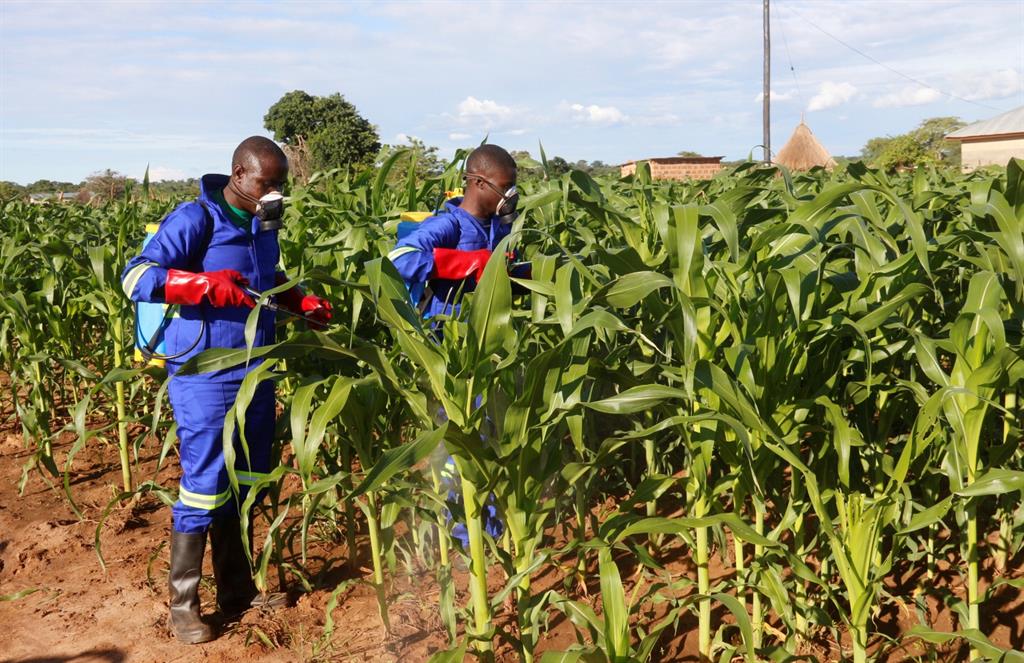Managing fall armyworm
The fall armyworm represents a major threat to especially smallholder farmers in Namibia.
The Food and Agriculture Organisation (FAO) has formulated a framework for partnerships for the sustainable management of fall armyworm in Africa which will focus on farmer education, testing of fall armyworm practices, monitoring and assessment, research, and policy support.
Namibia is one of the many countries which has already detected and reported the outbreak of fall armyworm this year.
Fall armyworm is a dangerous trans-boundary pest which can produce several generations per year. It has a high potential to spread continually - by travelling up to 100 km per night, and through trade routes.
The FAO says that farmers need significant support to be able to manage FAW sustainably in their cropping systems through integrated pest management activities.
According to the FAO, countries should scale-up efforts to collect specific evidence on the spread and impact of fall armyworm in African and Asian countries, with a specific focus on countries known to be at high risk of food insecurity due to the pest.
“Increase the use of the Fall Armyworm Monitoring and Early Warning System (FAMEWS) - a mobile application to identify and report the level of infestation and map its spread. The app also contains a training component which works offline and advises farmers on sustainable pest management.”
The FAO also recommends that since the pest cannot be eradicated, the long-term focus should be on the development of economically sound and sustainable pest management techniques for smallholder farmers.
“Support natural biological control efforts, such as use of predators and parasitoids rather than pesticides. Pesticides provide ineffective control of FAW and pose high risks to human health and the environment,” says the FAO.
It also says that the implementation of farmer field schools should be supported for the training of smallholder farmers on pest management.
Fall armyworm larvae prefer maize as a host plant, but can feed on more than 80 other plant species including rice, sorghum, vegetable crops and cotton.
Fall armyworm was first detected in central and west Africa in early 2016. Today, it is present in almost all countries of sub-Saharan Africa, with tens of millions of hectares of maize infested.
In Namibia a fall armyworm outbreak was reported on 14 February this year in areas such as Sacona, Kongola, Bukalo, Kasheshe and Musanga.
Following these reports the agriculture ministry undertook assessment missions in the affected areas, which confirmed that over 100 hectares of maize farmland was adversely affected by the worms.
In Namibia fall armyworm poses a significant threat to smallholder crop farmers, mainly maize farmers and has become a threat to food security. In the 2016/17 cropping season approximately 50 000 hectares of maize and millet were estimated to have been damaged by the pest which adversely affected 27 000 households.
ELLANIE SMIT
Namibia is one of the many countries which has already detected and reported the outbreak of fall armyworm this year.
Fall armyworm is a dangerous trans-boundary pest which can produce several generations per year. It has a high potential to spread continually - by travelling up to 100 km per night, and through trade routes.
The FAO says that farmers need significant support to be able to manage FAW sustainably in their cropping systems through integrated pest management activities.
According to the FAO, countries should scale-up efforts to collect specific evidence on the spread and impact of fall armyworm in African and Asian countries, with a specific focus on countries known to be at high risk of food insecurity due to the pest.
“Increase the use of the Fall Armyworm Monitoring and Early Warning System (FAMEWS) - a mobile application to identify and report the level of infestation and map its spread. The app also contains a training component which works offline and advises farmers on sustainable pest management.”
The FAO also recommends that since the pest cannot be eradicated, the long-term focus should be on the development of economically sound and sustainable pest management techniques for smallholder farmers.
“Support natural biological control efforts, such as use of predators and parasitoids rather than pesticides. Pesticides provide ineffective control of FAW and pose high risks to human health and the environment,” says the FAO.
It also says that the implementation of farmer field schools should be supported for the training of smallholder farmers on pest management.
Fall armyworm larvae prefer maize as a host plant, but can feed on more than 80 other plant species including rice, sorghum, vegetable crops and cotton.
Fall armyworm was first detected in central and west Africa in early 2016. Today, it is present in almost all countries of sub-Saharan Africa, with tens of millions of hectares of maize infested.
In Namibia a fall armyworm outbreak was reported on 14 February this year in areas such as Sacona, Kongola, Bukalo, Kasheshe and Musanga.
Following these reports the agriculture ministry undertook assessment missions in the affected areas, which confirmed that over 100 hectares of maize farmland was adversely affected by the worms.
In Namibia fall armyworm poses a significant threat to smallholder crop farmers, mainly maize farmers and has become a threat to food security. In the 2016/17 cropping season approximately 50 000 hectares of maize and millet were estimated to have been damaged by the pest which adversely affected 27 000 households.
ELLANIE SMIT




Comments
Namibian Sun
No comments have been left on this article